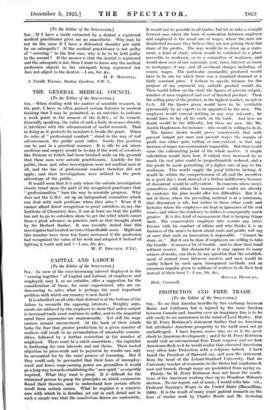THE GENERAL MEDICAL COUNCIL
[To the Editor of the SPECTATOR.] Sin,—When dealing with the matter of scientific research, in the past, I have so often praised certain features in medical training that I may be permitted, as an outsider, to indicate a weak point in the armour of the G.M.C., or its council. Generally speaking, the value of such a body decreases directly it interferes with the advancement of useful research. That in doing so it protects its members is beside the point. When its rules of " professional conduct " stand in the way of real advancement, the public must suffer. Surely this position can be met in a practical manner. It is idle to ask where medicine and surgery would be to-day if the work of scientists like Pasteur or Erlich had been brushed aside on the grounds that these men were outside practitioners. Luckily for the public, these and other investigators were not medical men at all, and the bar of professional conduct therefore did not apply, and their investigations were utilized to the great advantage of the public.
It would seem that it is only where the outside investigators closely tread upon the path of the recognized .practioner that " professionalism " bars the way to scientific progress. Why does not the G.M.C. set up an independent committee which can deal with such positions when they arise ? Even if it cannot afford direct recognition to great outsiders, as, say, the Institute of Chemistry does, it can at least see that the public has not to go to outsiders alone to get the relief which comes from a great advance, in practice such as that brought about by. Sir Herbert Barker. It was recently stated that this investigator had treated no fewer than 60,000 cases. Might not this number have been ten times increased if the profession had recognized the value of his work and adopted it instead of fighting it tooth and nail ?—I am, Sir, &c., W. P. DREAPER, F.LC. -


































































 Previous page
Previous page